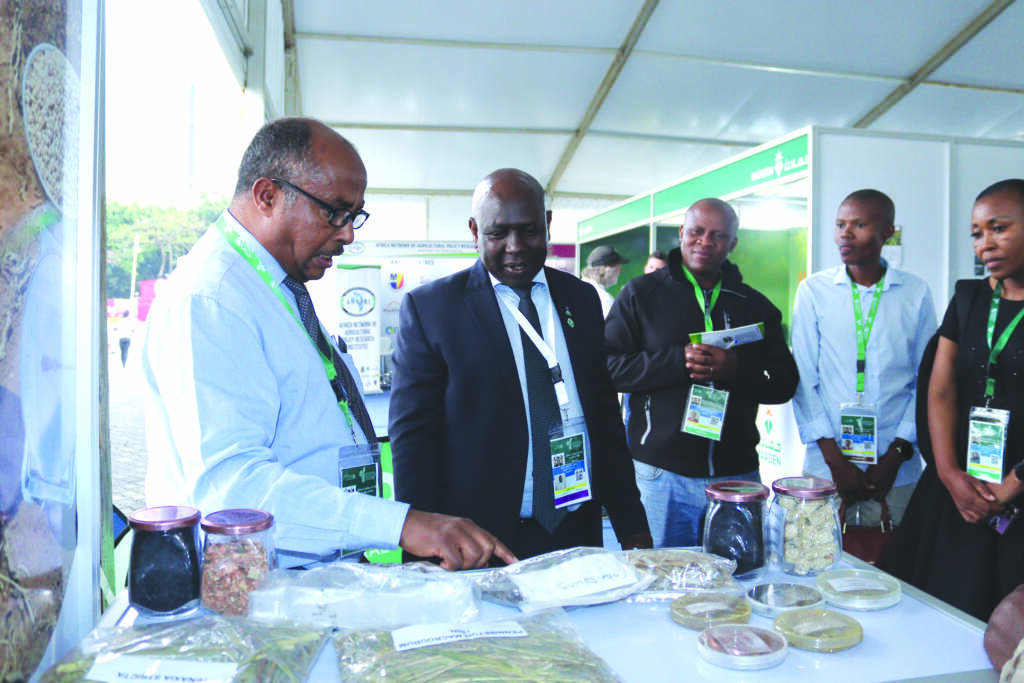Libuseng Molato
As Lesotho aims to achieve food self-sufficiency, understanding soil health becomes crucial for farmers seeking better yields this season. Seahlolo Newspaper interviewed soil experts and relevant departments to gain valuable insights on soil management for enhanced agricultural productivity.
Motlalepula Rasekoele, co-founder and managing director of AgriSoilSolutions MatLab, has dedicated his career to addressing soil health issues in Lesotho.
Born and raised in Qacha’s Nek and now based in Ha Abia, Maseru, Rasekoele’s passion for agriculture began in high school, where he engaged in small-scale farming.
With a BSc and MSc in Agriculture, specialising in Soil Science and Resource Conservation from the National University of Lesotho (NUL), he says he recognised a significant gap in soil testing services in Lesotho and founded AgriSoilSolutions MatLab in 2017.
The laboratory, affiliated with AFRILAB, provides essential soil testing services to farmers across the country.
“Basotho are now agri-entrepreneurs striving to produce large quantities, but their efforts are often hindered by soil with low fertility and acidity. It is crucial to conduct soil tests before planting to maximise farming advantages,” Rasekoele explained.
Soil testing offers several benefits:
1. Nutrient Availability: Identifies the nutrients available for plant uptake, enabling farmers to amend the soil to ensure plants receive the necessary nutrients for growth.
2. Drainage and Compaction Issues: Helps identify drainage and compaction problems that can hinder plant roots from accessing adequate air and water.
3. Optimal pH Levels: Determines the ideal soil pH for specific crops, ensuring the highest possible yields.
“Different crops require different soil pH levels. Most of the soil samples we receive have a low pH ranging from 5 to 6, while most crops prefer a pH of 6.5 to 7.5. We encourage farmers to use lime to neutralise their soil,” Rasekoele said.
AgriSoilSolutions MatLab provides comprehensive soil sampling and testing services to determine soil fertility and physical properties based on crop requirements.
“Parameters include nitrogen, phosphorus, potassium (NPK), soil pH, and soil texture. After completing the soil tests, farmers receive fertiliser and lime application rates, as well as tailored recommendations for their desired crops,” he explained.
“It is crucial for farmers to know their soil status before planting to make informed decisions about suitable crops and the exact quantities of fertilisers and lime needed,” Rasekoele emphasised.
Basotho farmers, especially those in commercial farming, understand the importance of soil testing. Many who have approached Rasekoele’s lab report satisfaction with the results and improved crop yields.
Seahlolo also consulted with Polao Moepi, the Principal Soil Scientist, and Palesa Leoaneka, the Principal Planning Officer from the Department of Soil and Water Conservation in the Ministry of Forestry, Range, and Soil Conservation, for additional insights.
“Following Global GAP certification, as a producer, it is essential for accessing formal or global markets. Knowing soil status is crucial for keeping records of manure and fertiliser usage,” they stated.
“Lesotho’s diverse soil series are named after their places of discovery; like the Maseru and Leribe soil series renowned for maize production.
…Some soil types, such as the Patsa, Ts’akholo, Maliele, and Popa series, have high clay content, limiting workability,” they explained.
“Farmers are advised not to overturn fields in these areas but to wait for adequate moisture before planting and to manage low organic matter by adding organic manure,” they advised.
Moepi continued, “Berea district is suitable for potatoes and maize, while the area from Masianokeng to Thaba Bosiu supports maize, peas, beans, and fruit trees. Mafeteng, with its low rainfall, requires serious management while areas like Kolo and Ts’akholo are ideal for wheat, soybeans, and olives.
“In the highlands, green apples thrive due to climate changes affecting growing seasons. The northern parts of the country, with high precipitation, have acidic soils below pH 7, requiring lime application. In contrast, the southern parts, particularly Quthing, have alkaline soils above pH 7, necessitating crops that tolerate alkalinity or management to bring the pH closer to neutral,” they indicated.
Despite maize being a staple food,the pair stressed that not all farmers should produce it.
“They are encouraged to check the online platform lesis.gov.ls for soil status guidance from the country to plot level and to consult district offices,” the advised.
They pointed out that climate change has shifted Lesotho’s normal temperatures, with projections indicating a 1 to 2 percent increase by 2050.
“Farmers should adapt their production to these changing growing seasons to maintain productivity. By understanding and managing their soil health, Basotho farmers can significantly improve their agricultural output, contributing to food security and economic growth in Lesotho,” they said.

Your Trusted Source for News and Insights in Lesotho!
At Newsday Media, we are passionate about delivering accurate, timely, and engaging news and multimedia content to our diverse audience. Founded with the vision of revolutionizing the media landscape in Lesotho, we have grown into a leading hybrid media company that blends traditional journalism with innovative digital platforms.









